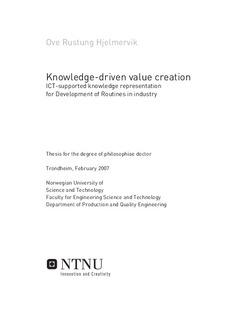ICT-supported knowledge representation for Development of Routines in industry
Doctoral thesis
Permanent lenke
http://hdl.handle.net/11250/240594Utgivelsesdato
2007Metadata
Vis full innførselSamlinger
Sammendrag
The ability to develop operating routines through the support of information and communication technology (ICT) is being valued by the business community as a source of competitive advantage in the information economy; and research concerning the facilitating role of such technology in relation to organizational learning and development of routines is therefore required. In this thesis the focus is directed at the relationship between communication technology and the development of routines in an industrial organization leading to enhanced value creation. The impact computer-supported knowledge representation has on an organization’s ability to change through development of operating routines are addressed, and propositions concerning the effects on different aspects of communication technology (e.g. system structure and functionality) and organizational environment (e.g. organizational learning, empowerment, systemic innovation, and absorptive capacity) are developed. The moderating role (i.e. the learning mechanisms) of an organization’s ability to learn from, and share, experience within a multilevel nested organizational structure is also discussed and evaluated.
The main goal of this study has been to reveal and explain how operating routines are developed and learned through ICT-supported knowledge representation, and on this basis build concepts and methods that can be used to improve the development of operating routines in business organizations. In this context we have developed a deliberate organizational learning model (DOLM). The main contributions of this work are the following:
• Development of operating routines may be enhanced through computercommunication given a multilevel nested iterative organization structure applying an ICT-supported deliberate organizational learning model.
• Empowered employees are willing to participate in the development of routines through such communication by sharing experience that may impact on operative and strategic activities, resulting in enhance productivity.
• Employees participating directly, or indirectly, in the design of ICT systems are positive to applying computers for the purpose of organizational learning and development of routines.
• Because of their capacity to absorb new knowledge within a context specific domain, experienced operational personnel understand new routines presented through ICTsupported deliberate organizational learning structure.
Many people take it for granted that computers support organizational learning, yet to the best of our knowledge little empirical proof has been forthcoming through the literature. We will argue that the development of operating routines can be enhanced through the application of a computer-based deliberate organizational learning model. Furthermore, our case identifies a multilevel nested iterative organization structure as a contributing mechanism for such a model to succeed. The current theory on empowerment does not say anything about employees’ willingness to apply ICT, nor does it suggest that employees are willing to share experience through the application of ICT. Our findings clearly indicate that empowered employees are applying ICT in the pursuit of developing routines and are willing to share experience through computers. Furthermore, our findings suggest systemic innovation theory to include employees that are indirectly participating in the design of systems as being positive to using computers. Such indirect participation includes employees knowing of colleagues participating in system design. While some theories argue that employees learn new routines through story-telling within a community-of-practice (COP), our data indicate that new operating routines transferred to experienced operators through ICT can be learned. Experienced operators learn new routines through having an absorptive capacity because knowledge will diffuse more rapidly among employees who have prior experience.
Our case study shows that organizations can develop operating routines supported by knowledge represented in ICT. This research contributes to the understanding that development of routines can take place through an ICT-supported deliberate organizational learning model applied within an employee-empowered multilevel nested iterative organization structure.
A best practice knowledge management (KM) system representing the firm’s operating routines is studied over time as it is being implemented in the business units within a corporation. Our focus is on change processes through development of operating routines by studying how the organization can learn from its experience, share such experience and from accumulated experience develop new routines. This thesis is a longitudinal explorative case study, basing its findings on in-dept interviews at operator, middle and senior management levels. We are basing our observations primarily on the cognitive/behavioural organisational learning theory. Based on our observations we mapped and analyzed if, how and under which circumstances an organization, supported by ICT-represented knowledge, is able to develop operating routines and thus enhance the value creation in the company. On this basis we have developed a set of “within-case” propositions. These propositions predict how and under which circumstances organizations may learn through the support of ICT, leading to development of operating processes and routines for the purpose of enhancing value creation in business organizations.
Some literature argues that knowledge is tacit and organizations learn only through practice. Our findings cannot confirm this. We have through the application of the cognitive/behavioural theory tested out organizational learning. Our research indicates that in context specific situations experienced employees can learn new routines through computer systems support. However, in order for organizations to learn, it is not enough to just implement a computer system. Our findings suggest a need for the implementation of a strategic process where the development of an integrated DOLM is the objective. Furthermore, certain organizational structures need to be in place for such a system to be applied resulting in capturing and sharing accumulated experience. In this sense strategy, change processes, and KM systems are intrinsically linked.
This research is based on a case study of Hydro Aluminium’s BestPracticeSystem (BPS), a successful in-house developed enterprise KM system implemented in the period 2003/4. The case study demonstrates the usefulness of the model to support change processes through development of operating routines, and the improvement in productivity that can be achieved by implementing a deliberate organizational learning model in conjunction with a process oriented manufacturing practice. Knowledge represented through ICT can drive value creation.
